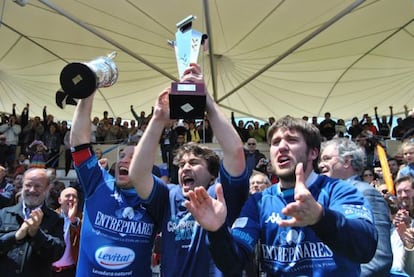Trying times for Spanish rugby
Players and coaches want new national strategy, plus more government help


Antiquated infrastructure, lack of money, poor management, and an inability to create an attractive product for sports fans are the main problems holding back Spanish rugby, says the country's FER national federation. "We are virtually invisible, and we have got things wrong too many times. Now is the moment to get back on the right path," says Tomás García Menéndez, FER's sporting director. The national side finished bottom in the second tier of the Rugby World Cup qualifying round in April.
In June, the FER's newly appointed president, Javier González Cancho, called a meeting with representatives from teams and federations in a bid to set out a new route map for Spanish rugby. "The roots of the problem date back to the Barcelona 1992 Olympic Games," says García Menéndez. "Since then every Spanish sport has taken off, with the exception of rugby. There was a time when we were on a par with Italy, but they have since moved up to play with the best because they put money into the sport, while here we are bleeding to death."
Nicolás Orozco, president of Alcobendas rugby team, says that part of the reason rugby has not captured the public's imagination is that it is "still considered an elite sport, one played in some universities but at very few schools. Boys are not learning to play the game until they are too old."
Pablo Feijóo, a Spanish international and captain of the national seven-a-side team, says that the sport has been dominated by gentlemen amateurs. "We need to professionalize the whole structure of the game, from top to bottom." Feijóo, like many other Spanish rugby players, went to play in England. "We all want to play at the highest level, and that isn't possible here yet. In England, a player at the beginning of their career earns around 2,500 euros a month. In Spain, you're lucky if you make 1,500 euros a month. In France, the minimum salary is 6,000 euros a month."
We are Spain's fifth-biggest sport in terms of players but can't make money"
Which is why many Spanish clubs have come to rely on foreign players, a policy that has brought few long-term results. "We are building the pyramid the wrong way up," says Juanjo Peloco, president of the club Las Rozas: "We need solid foundations. People like rugby, and the number of players signed up to federations is around 24,000, making it the fifth-biggest sport in the country in terms of numbers. But it is still not able to make money."
José Ignacio Inchausti, the national seven-a-side team's coach, says the crisis in rugby has been made worse by the wider economic crisis. "There are no sponsors and no subsidies, so we can't sign players... It's a vicious circle."
Spain's sevens team will be playing in the Rio Olympics in 2016, and Inchausti hopes success there will lead to "a change in direction."
García Menéndez says Spanish rugby failed to take advantage of the Superibérica project, launched four years ago with the backing of the Canal Plus television network. "The FER saw it as a threat; they thought that by televising the sport and through franchises, they would be sidelined."
"The problem has traditionally been too much infighting," says Peloco.
The first attempt to professionalize the game in Spain may have failed, but the FER says it is determined to turn things round. "This is a great sport, but one that few people in this country know anything about. The values of the game are strong, but it will be a long process explaining rugby to people," says González Cancho.
Tu suscripción se está usando en otro dispositivo
¿Quieres añadir otro usuario a tu suscripción?
Si continúas leyendo en este dispositivo, no se podrá leer en el otro.
FlechaTu suscripción se está usando en otro dispositivo y solo puedes acceder a EL PAÍS desde un dispositivo a la vez.
Si quieres compartir tu cuenta, cambia tu suscripción a la modalidad Premium, así podrás añadir otro usuario. Cada uno accederá con su propia cuenta de email, lo que os permitirá personalizar vuestra experiencia en EL PAÍS.
¿Tienes una suscripción de empresa? Accede aquí para contratar más cuentas.
En el caso de no saber quién está usando tu cuenta, te recomendamos cambiar tu contraseña aquí.
Si decides continuar compartiendo tu cuenta, este mensaje se mostrará en tu dispositivo y en el de la otra persona que está usando tu cuenta de forma indefinida, afectando a tu experiencia de lectura. Puedes consultar aquí los términos y condiciones de la suscripción digital.








































